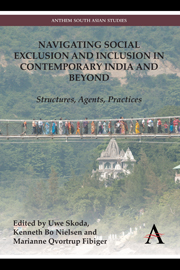 Navigating Social Exclusion and Inclusion in Contemporary India and Beyond
Navigating Social Exclusion and Inclusion in Contemporary India and Beyond from Part III - Resources and Development
Published online by Cambridge University Press: 05 September 2013
Despite strong and highly progressive constitutional and legislative measures upholding equity, discrimination on the basis of caste, class and gender remains a reality for many of India's 1.4 billion citizens. Major disparities exist in poverty levels, mortality rates, educational attainments and access to resources between urban and rural areas, regions, social groups and between men and women. India today is a country of stark contrasts and striking inequalities. The starting point for this chapter is a reflection on experiences in social inclusion in the context of the Indo-Swiss Participative Watershed Development Project, a development project implemented in three districts in the South Indian state of Karnataka, with which two of the authors were closely affiliated. The chapter analyses the everyday functioning of new institutional spaces, in this case project-supported water management committees, for understanding the evolving dynamics between different individuals, social groups and localities while collaborating and competing in development initiatives. The authors are particularly interested in what happens to such spaces beyond the scope of the project intervention – whether they continue creating opportunities, building confidence and political capabilities for contesting exclusionary social practices and public resource distribution, or whether they are captured by resurgent patronage politics. Through the use of an extended case study method, based on interviews conducted with families in 2004, 2005 and 2010, as well as project data and observations, the authors seek to understand these temporal dynamics.
To save this book to your Kindle, first ensure [email protected] is added to your Approved Personal Document E-mail List under your Personal Document Settings on the Manage Your Content and Devices page of your Amazon account. Then enter the ‘name’ part of your Kindle email address below. Find out more about saving to your Kindle.
Note you can select to save to either the @free.kindle.com or @kindle.com variations. ‘@free.kindle.com’ emails are free but can only be saved to your device when it is connected to wi-fi. ‘@kindle.com’ emails can be delivered even when you are not connected to wi-fi, but note that service fees apply.
Find out more about the Kindle Personal Document Service.
To save content items to your account, please confirm that you agree to abide by our usage policies. If this is the first time you use this feature, you will be asked to authorise Cambridge Core to connect with your account. Find out more about saving content to Dropbox.
To save content items to your account, please confirm that you agree to abide by our usage policies. If this is the first time you use this feature, you will be asked to authorise Cambridge Core to connect with your account. Find out more about saving content to Google Drive.